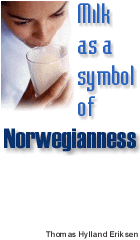 |
|
Advertisment on server
|

|
|
|
|
 Administration and social conditions
Administration and social conditions
|
Norway is a constitutional hereditary monarchy. Its legislative body is the Storting, the 165 members of which are directly elected to four-year terms by universal suffrage for citizens at least 18 years of age. The government, comprising the prime minister and the Statsrad (State Council), is nominally chosen by the monarch with the approval of the Storting. The Storting settles most matters in unicameral plenary sessions. Only when voting on laws is the Storting divided into two houses. One-fourth of the members are chosen to constitute the Lagting, or upper house, while the remaining members constitute the Odelsting, or lower house. Bills must be passed by both houses in succession.
In the 1990s more than one-third of the representatives to the Storting were women, the highest proportion of women in a national legislature in the world. Gro Harlem Brundtland became Norway's first woman prime minister in 1981 and was in and out of office for the next 15 years. From 1986 women also comprised about one-third of the Statsrad.
Government
The constitution of Norway, drafted in 1814 when Norway left the 434-year union with Denmark, was influenced by British political traditions, the constitution of the United States, and French revolutionary ideas. Amendments can be made by a two-thirds majority in the Storting. Unlike many parliamentary forms of legislature, the Storting cannot be dissolved during its four-year term of office (amendments to overturn this restriction have been defeated frequently since 1990). If a majority of the Storting votes against an action advocated by the Statsrad, the minister responsible or the whole Statsrad resigns. In legislative matters the monarch has a suspending right of veto, but since the 91-year union with Sweden was dissolved in 1905 this veto has never been exercised.
Norway's political life functions through a multiparty system. Before national elections, held every four years, political parties nominate their candidates at membership meetings in each of Norway's fylker (counties). Each fylke elects a number (determined by the size of its population) of representatives to the Storting, with party representation allotted on the basis of the percentage of the vote received.
The Norwegian Labour Party (Det Norske Arbeiderparti; DNA), the dominant party from before World War II until the mid-1960s, advocates a moderate form of socialism. In its many years of governing Norway, however, it nationalized only a few large industrial companies. The Conservative Party, which traditionally has been the major alternative to the DNA, accepts the welfare state and approves of the extensive transfers of income and of government control of the economy. Between 1945 and 1965 the government was formed by the DNA, which won clear majorities in the Storting.
After 1965, however, no single party was able to obtain a majority in the legislature, and Norway was governed by a succession of coalitions and minority governments. Other political parties that played important roles during this period include the Christian People's (Democratic) Party, the Centre Party (called the Agrarian Party until 1958), the Socialist Left Party, the Progress Party, and the Liberal (Venstre) Party.
The city of Oslo constitutes one of the country's 19 counties. The other counties are divided into rural and urban municipalities, with councils elected every fourth year (two years after the Storting elections). For the country as a whole, the municipal elections tend to mirror the party division of the Storting. The municipal councils elect a board of aldermen and a mayor. Many municipalities also employ councillors for such governmental affairs as finance, schools, social affairs, and housing. Norwegians pay direct taxes to both federal and municipal governments.
The counties can levy taxes on the municipalities for purposes such as roads, hospitals, secondary schools, and other joint projects. The county councils comprise delegates from the municipalities, while the county governors are appointed by the Statsrad.
|
 |
|
Anons |

|
| Links |


|
|

